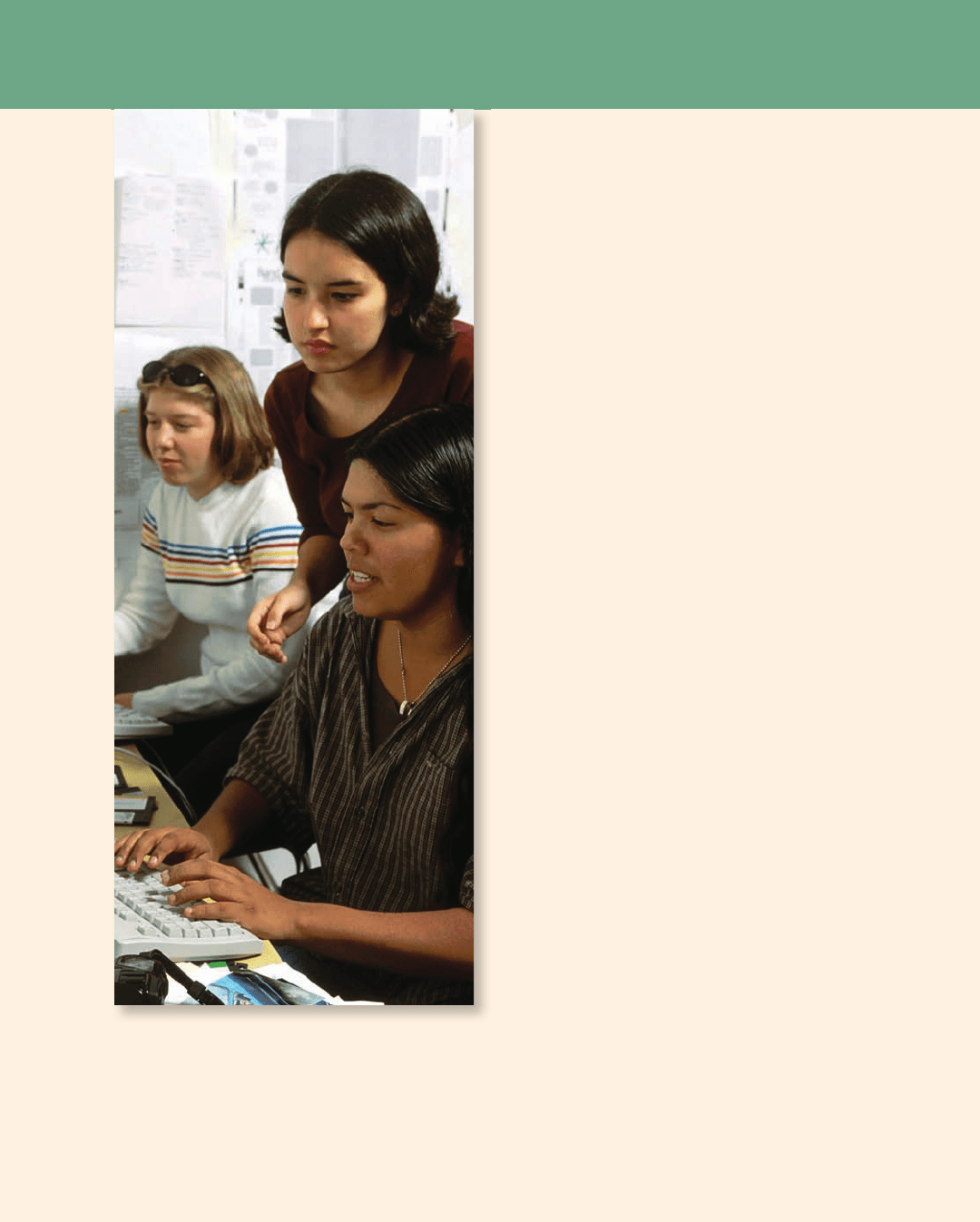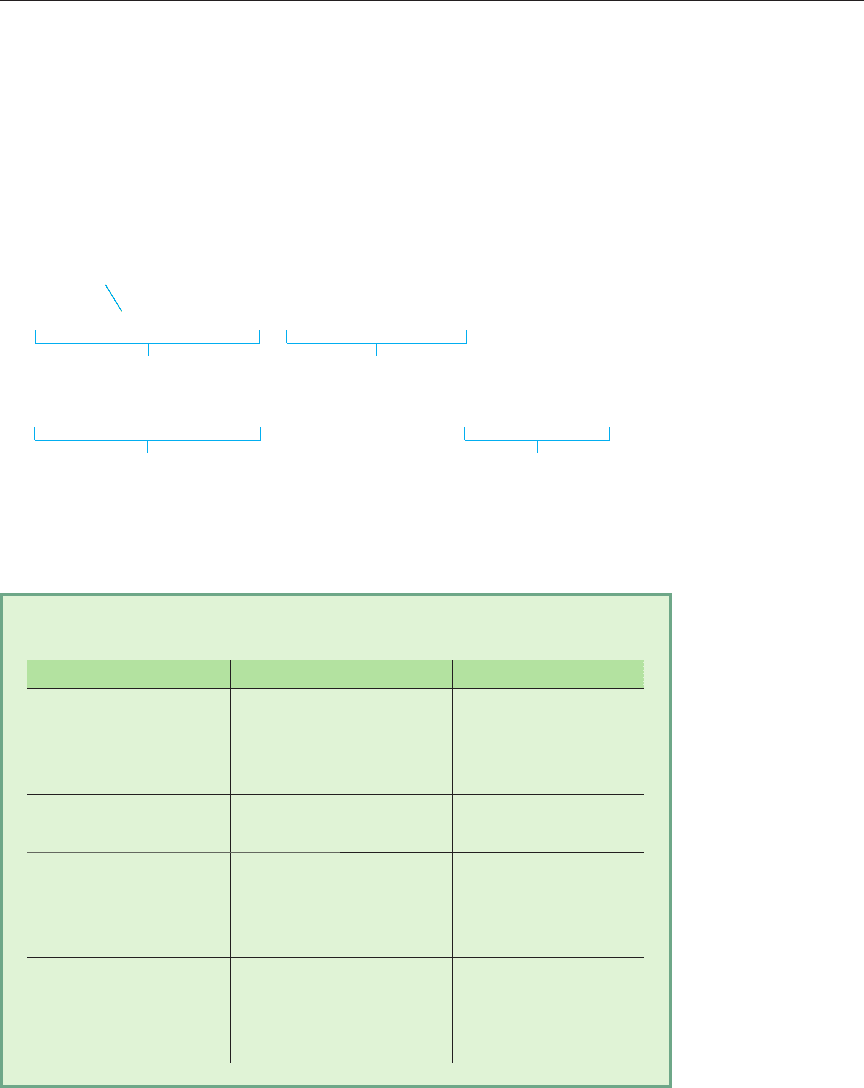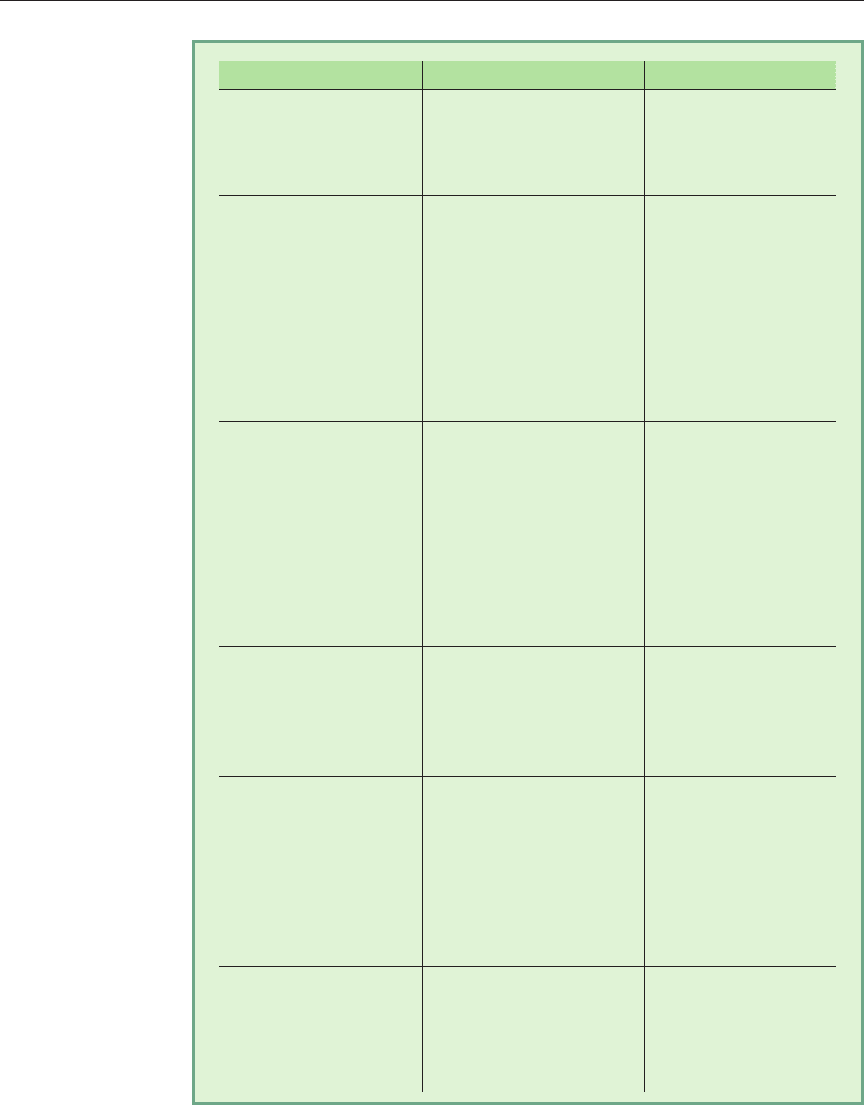Anker Susan. Real Essays with Readings with 2009 MLA Update
Подождите немного. Документ загружается.


WRITING ESSAYS
Part Three
Special College
Writing Projects
19. Writing under Pressure 319
20. Writing Summaries and
Reports 334
21. Writing the Research Essay 346
ANK_47574_19_ch19_pp317-333 r3 ko.indd 317ANK_47574_19_ch19_pp317-333 r3 ko.indd 317 10/29/08 10:12:07 AM10/29/08 10:12:07 AM

ANK_47574_19_ch19_pp317-333 r3 ko.indd 318ANK_47574_19_ch19_pp317-333 r3 ko.indd 318 10/29/08 10:12:10 AM10/29/08 10:12:10 AM

319
You Know This
You’ve taken tests under pressure.
• You study for the test for your
driver’s license.
• You practice and try out for a
team.
19
Writing under Pressure
Tests and Essay Exams
You will need good reading and writing skills to do well on the many tests
you will take in college. To become a good test-taker, you also need to
develop good test-taking strategies.
Studying for Tests
Some students spend hours studying for a test that they then fail. Often,
they have not studied effi ciently. This chapter will give you tips on study-
ing for tests and for taking essay exams and other timed writing assign-
ments.
Here are fi ve reliable tips to help you study for any exam:
TIPS FOR STUDYING
1.
Ask about the test.
2. Study with a partner or a group.
3. Predict what will be on the exam.
4. Use study aids.
5. Review actively.
ANK_47574_19_ch19_pp317-333 r3 ko.indd 319ANK_47574_19_ch19_pp317-333 r3 ko.indd 319 10/29/08 10:12:10 AM10/29/08 10:12:10 AM

WRITING ESSAYS
320 Part Three • Special College Writing Projects
Ask about the Test
Ask your instructor about an upcoming test. Just make sure you ask rea-
sonable questions.
ASK NOT
• What part of the course or • What’s on the test?
text will it cover?
• Will the format be multiple • You’re not going to give us an
choice, short answer, or essay? essay question, are you?
• Will we be allowed to use notes • We can just look up the answers,
or books? right?
• What percentage of my course • Is this test important?
grade will this count for?
• Can you recommend what • Do I need to read the book?
to review? Is the stuff you said in class
important?
• Will we have the whole period • How long is it?
to complete the test?
• I know I have to miss class that • Is there a makeup test?
day (give your reason). Can I
arrange to take the test at
another time?
Write down your instructor’s answers to your questions. Don’t rely on
your memory. You will be busy enough remembering the material for the
exam without having to remember what your instructor said.
Study with a Partner
or a Group
Forming a study group is well worth the time and effort it takes. Setting a
time to study with others guarantees that you’ll study, and pooling ideas
improves everyone’s ability to predict what will be on the test. Do some
preparation before group meetings so that you make the most of the study
time. The tips on the following page can help study group members pre-
pare for a meeting:
■ DISCUSSION
Ask students why the
questions in the “Not”
column are inappro-
priate. Use humor to
describe how you as an
instructor might react
to such questions.
■ TEACHING TIP
If students are will-
ing, create a contact
list for the class with
everyone’s telephone
number and e-mail
address. Students can
then use the list to
arrange study groups.
ANK_47574_19_ch19_pp317-333 r3 ko.indd 320ANK_47574_19_ch19_pp317-333 r3 ko.indd 320 10/29/08 10:12:10 AM10/29/08 10:12:10 AM

WRITING ESSAYS
Chapter 19 • Writing under Pressure 321
• Each person can take responsibility for a particular section of the
material, preparing a list of fi ve to ten questions that might be on
the test. Questions and possible responses can then be discussed in
the group.
• Each person can photocopy his or her notes on a particular chapter,
section, or topic and distribute them to the members of the group.
• Each person can come up with a list of the fi ve most important things
he or she learned about the material to be covered on the test.
• Each person can make a list of things he or she doesn’t understand.
Predict What Will Be
on the Exam
Whether you are studying with other people or by yourself, make a list of
what you think will be on the exam. Look over your notes, assignments,
and any previous tests or quizzes. Try writing questions for that material,
and then try answering your own questions.
If you are confused about any material, ask about it either in class,
after class, or during your instructor’s offi ce hours. Your instructor will
probably welcome questions by e-mail as well. Do not go into an exam
knowing that you don’t understand a major concept.
PRACTICE 1 PREDICTING THE CONTENT OF A TEST
Imagine that you are having a quiz in this class next week. With a partner or
in a small group, identify three topics that might be on that quiz, and write
one question for each.
TOPIC: Fragments
QUESTION: What are four kinds of sentence fragments?
TOPIC:
Answers will vary.
QUESTION:
TOPIC:
QUESTION:
TOPIC:
QUESTION:
ANK_47574_19_ch19_pp317-333 r3 ko.indd 321ANK_47574_19_ch19_pp317-333 r3 ko.indd 321 10/29/08 10:12:10 AM10/29/08 10:12:10 AM

WRITING ESSAYS
322 Part Three • Special College Writing Projects
Use Study Aids
Use one or more of the following study aids — or any other that is available
to you — to ensure your success:
• Reread your notes, looking especially for anything you’ve underlined or
marked in some other way.
• If you are being tested on material from your textbook, reread chapter
reviews, summaries, and boxes containing key concepts.
• Review handouts from your instructor.
• Consider other ways to review material — audiotapes, videos, computer
exercises, study guides, the course or textbook Web site, and so on.
Review Actively
The following are some suggestions for reviewing material actively:
• To review material from a book, take notes. Improve your retention by
writing information in your own words.
• To review handouts, use a colored pen or highlighter to mark the most
important ideas, most useful facts, and other key information.
• Say important material aloud. Many people learn well by hearing some-
thing in addition to seeing it.
• To review notes, rewrite them in other words or in another format. For
example, if you’ve written an outline, transform it into a chart or dia-
gram that shows the relationships among ideas (see, for example, the
clustering diagram on p. 65).
Test-Taking Strategies
Good test-takers know how to manage the test-taking process. They start
with studying, and after they have studied, they move on to the next steps.
■ TEACHING TIP
Show students the
study aids in a chap-
ter of this book — the
major headings, the
boxed information,
defi nitions, and so
forth.
■ For more on active,
critical reading,
see Chapter 2,
pages 22–34.
STRATEGIES FOR TAKING EXAMS
1.
Be prepared.
2. Manage your nerves.
3. Understand the directions.
4. Survey the whole exam before starting.
5. Develop a plan.
ANK_47574_19_ch19_pp317-333 r3 ko.indd 322ANK_47574_19_ch19_pp317-333 r3 ko.indd 322 10/29/08 10:12:10 AM10/29/08 10:12:10 AM

WRITING ESSAYS
Chapter 19 • Writing under Pressure 323
Be Prepared
If you have followed the advice in the fi rst part of this chapter, you’ve
already done the most important preparation. But don’t arrive at the exam
and discover that you’ve left something essential at home. Take some time
the night before to think about what you need. Make a list of what to bring
(pen? books? calculator? notebook? textbook? computer disk? watch?), and
assemble everything so that it’s ready to go.
Manage Your Nerves
Get as much rest as possible the night before the exam, and allow extra
time to get to class. Arrive early enough to settle in. Sit up straight, take
a deep breath, and remind yourself that you know the material: You’re
prepared; you’re ready; you will pass. When your instructor starts to talk,
look up and listen.
Understand the Directions
Misunderstanding or ignoring directions is a major reason students do
poorly on exams, so please pay attention to the advice here. First, listen to
the spoken directions your instructor gives. It’s tempting to start fl ipping
through the exam as soon as you get it rather than listening to what your
instructor is saying. Resist the temptation. Your instructor may be giving
you key advice or information that’s not written elsewhere, and you may
miss it if you’re not paying attention.
Second, when you begin the test, carefully read the written direc-
tions for each part. Sometimes, students answer all of the questions in a
section only to fi nd out afterward that the directions said to answer only
one or two. If you don’t understand any part of the directions, be sure to
ask your instructor for clarifi cation.
Survey the Whole Exam
before Starting
Look over the whole exam before doing anything. See how many parts the
exam has, and make sure to look on both sides of all pages. Note the kinds
of questions and the number of points each question or part is worth. The
toughest questions (and the ones worth the most points) are often at the
end, so you will want to leave enough time to answer those.
■ DISCUSSION
Early in the term,
discuss how to prepare
for an exam from
the beginning of the
course. Discuss the
hazards of cramming
for a test, and empha-
size that college-level
work requires consis-
tent study over the
course of the term.
■
TEACHING TIP
Most people need to
jot down directions
that are given orally
and highlight or make
notes about written
directions. Emphasize
to students the impor-
tance of understanding
directions.
■
TEACHING TIP
Assure students that
neither surveying nor
developing a plan takes
much time away from
the test-taking pro-
cess. Planning should
take only three to fi ve
minutes.
ANK_47574_19_ch19_pp317-333 r3 ko.indd 323ANK_47574_19_ch19_pp317-333 r3 ko.indd 323 10/29/08 10:12:10 AM10/29/08 10:12:10 AM

WRITING ESSAYS
324 Part Three • Special College Writing Projects
Develop a Plan
First, budget your time. After surveying the whole test, write down how
much time you will allow for each part. You might even fi nd it helpful to
calculate what time you want to start each section: Part 1 at 9:40, Part 2
at 9:55, and so on. Make sure you leave enough time for the parts with
the highest point values, such as essay questions: They can take longer
than you think they will. As you plan your time, keep in mind how much
time you really have for the exam: A “two-hour” exam may be only one
hour and fi fty minutes once your instructor has fi nished giving directions.
Remember also to leave a few minutes to check your work.
Second, decide on an order — where you should start, what you
should do second, third, and so on. Start with the questions you can an-
swer quickly and easily, but stay within your time budget on them.
Finally, monitor your time during the exam. If you fi nd you’re really
stuck on a question and you’re going way over your time budget, move on. If
you have time at the end of the exam period, you can always go back to it.
Answering an Essay Question
An essay question requires writing several well-supported paragraphs in
response to a question or prompt within a set amount of time.
Essay questions on an exam are usually worth more points than short-
answer or multiple-choice questions, so they deserve special attention.
Apply the following strategies to essay questions.
■ DISCUSSION
Ask students to discuss
their experiences with
taking tests that have
multiple parts (includ-
ing standardized tests).
What strategies not
listed here did they
fi nd especially
effective?
■
TEACHING TIP
Give students practice
essay exams on topics
that will allow them
to determine how to
focus their ideas.
Language Note: Read the whole test through for any vocabulary
you don’t understand or cultural issues you are not familiar with. If
you have questions, go to the teacher, and ask for clarifi cation.
STRATEGIES FOR ANSWERING AN ESSAY QUESTION
1.
Read and analyze the question.
2. Write a thesis statement.
3. Make an outline.
4. Write your answer.
5. Reread and revise your answer.
ANK_47574_19_ch19_pp317-333 r3 ko.indd 324ANK_47574_19_ch19_pp317-333 r3 ko.indd 324 10/29/08 10:12:11 AM10/29/08 10:12:11 AM

WRITING ESSAYS
Chapter 19 • Writing under Pressure 325
Read and Analyze the Question
Read an essay question carefully so that you know exactly what it calls for
you to do. Look for three kinds of key words:
• Words that tell you what subject to write on.
• Words that tell you how to write about it.
• Words that tell you how many parts your answer should have.
Tells how many parts the answer should have
Discuss two major causes of personal bankruptcy in this country.
Tells how to write the response Tells what subject to write about
Defi ne and give examples of the phenomenon of global warming.
Tells how to write the response Tells what subject to write about
The following chart translates some common types of essay questions into
an action plan.
Analyzing Essay Questions
KEY WORDS WHAT’S REQUIRED SAMPLE ANSWER
“Analyze the theory
of relativity.”
Break into parts and
discuss.
“The theory
of relativity is
made up of four
components . . .”
“Defi ne
carpetbaggers.”
State the meaning, and
give examples.
“Carpetbaggers were
people who. . . .”
“Describe the steps
in taking a blood
pressure reading.”
List and explain the
steps.
“To take a person’s
blood pressure,
fi rst. . . . Next, . . . .
Finally, . . . .”
“Discuss the
causes of poor air
quality.”
List and explain the
causes.
“Poor air qual-
ity is caused by
several different
factors. . . .”
continued
■ TEACHING TIP
Ask students to bring
in exams with essay
questions from other
classes. Look for the
key words used on
these exams — whether
from this list or in addi-
tion to it — and discuss
what they mean.
ANK_47574_19_ch19_pp317-333 r3 ko.indd 325ANK_47574_19_ch19_pp317-333 r3 ko.indd 325 10/29/08 10:12:11 AM10/29/08 10:12:11 AM

WRITING ESSAYS
326 Part Three • Special College Writing Projects
KEY WORDS WHAT’S REQUIRED SAMPLE ANSWER
“Discuss the
effects of ozone
levels.”
List and explain the
effects.
“Ozone levels af-
fect air quality in
several different
ways. . . .”
“Discuss the
meaning of
obesity.”
Defi ne and give
examples.
“Obesity, which
the NIH defi nes
as having a body
mass index of 30 or
higher, is reaching
epidemic propor-
tions in some parts
of the industrialized
world. . . .”
“Compare
obsession and
compulsion.”
List and give examples
of how the two items
are similar. (Note:
Sometimes the word
compare can mean to
write about both simi-
larities and differences.
When in doubt, ask.)
“Obsession and
compulsion are
both. . . .”
“Obsession and
compulsion share
some traits such
as . . . , but they
differ in. . . .”
“Discuss the simi-
larities and dif-
ferences between
obsession and
compulsion.”
List and give examples
of how the two items
are similar and how
they’re different.
“Obsession and
compulsion share
some traits such
as . . . , but they
differ in. . . .”
“Contrast obsession
and compulsion.”
or
“Discuss the
differences
between obsession
and compulsion.”
List and give examples
of how the two items
are different.
“Obsession and
compulsion are
related disorders,
but they are not the
same. . . .”
“Evaluate John
Smith’s argument.”
Make a judgment
about the subject, and
support that judgment
with reasons, opinions,
and evidence.
“John Smith’s
argument in favor
of X has several
weaknesses. . . .”
ANK_47574_19_ch19_pp317-333 r3 ko.indd 326ANK_47574_19_ch19_pp317-333 r3 ko.indd 326 10/29/08 10:12:11 AM10/29/08 10:12:11 AM
